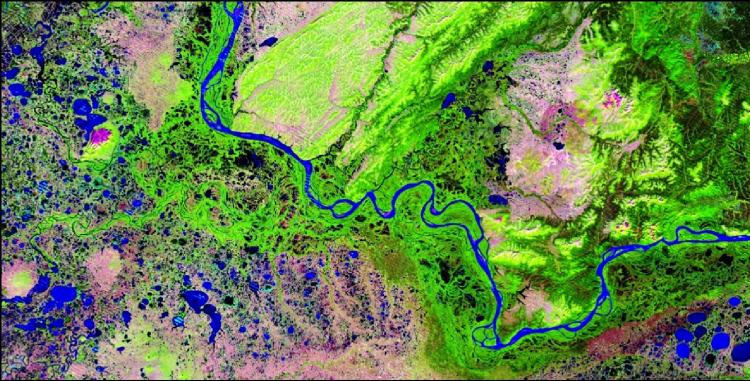Arctic communities planning for abrupt permafrost thaw
A new INSTAAR-led project will engage Indigenous and Western knowledge systems to better understand abrupt permafrost change in Alaska. The National Science Foundation selected the project as part of its Navigating the New Arctic funding area, one of ten “Big Ideas” that NSF is investing in as an area of profound national challenge and opportunity.

A view of the Yukon River watershed in Alaska from the U.S. Geological Survey, using Web-Enabled Landsat Data.
The research project brings Alaskan communities together with social and natural scientists to examine changes in permafrost thaw lake environments, including associated effects on villages in the Yukon River watershed.
The combined knowledge will be used to provide forecasts that inform about global climate, landscape change, subsistence activities, food and water security, economy, community planning, and cultural practices.
The Arctic is warming faster than most places on Earth. The permafrost—or frozen soil—that lays under much of its surface is on an inflection point for abrupt thaw. As permafrost thaws, it releases carbon into the atmosphere and alters the landscape. In many places, newly formed lakes dot the land, some emitting bubbles of methane from the underlying lakebed. This creates a feedback loop of even more global warming.
These changes will put local communities at risk, rapidly shifting factors that affect subsistence hunting, drinking water quality, travel, and local economies. Rapid permafrost thaw also has impacts on global climate that climate models do not yet fully take into account.
INSTAAR Research Associate Tyler Jones is the lead investigator on the project, joined by researchers from the Yukon River Inter-Tribal Watershed Council (Science Director Edda Mutter), Northern Social-Environmental Research (Tracie Curry), CIRES (Caroline Alden), CU Mechanical Engineering (Greg Reiker), INSTAAR (Bruce Vaughn), and the University of Alaska Fairbanks (Katey Walter Anthony and Tracie Curry).
The study domain and project goals were defined at the outset by the Yukon River Inter-Tribal Watershed Council and local stakeholders to focus on lake area change, drinking water quality, and frozen transport corridors—topics identified collectively by communities as critically important.
“The council is connected to these communities in a way that we can’t be,” said Jones. “They can help guide our science in a way that is best for each community.”
The project includes connections with five Indigenous villages in the Yukon River watershed and one village with a diverse population just north of Fairbanks. Project scientists and interns and advisors from Yukon villages will collaborate through the framework of the watershed council, and the associated Indigenous Observation Network (ION), to measure lake area change, water chemistry, extent of ground melt, and methane emissions. Interviews and participatory mapping with knowledgeable local residents will provide contextual knowledge to supplement these measurements, all of which will be integrated into a permafrost model to provide forecasts of future change.
“The results of the study will be pertinent to Native, State, and Federal entities,” said Jones. “We are working to contribute to both the understanding of global climate dynamics and local societal needs.”
Other outcomes of the project will include annual town halls with local communities and an expanded permafrost modeling toolkit that includes changing lake environments.
The pandemic has posed several challenges right at the start of the project, said Jones. Colorado-based scientists will potentially need to undergo a fourteen-day quarantine period before visiting field sites in Alaska; and some villages will be off limits indefinitely. “Most or all of the villages aren’t interested in having outside visitors yet—and rightly so—to protect themselves,” said Jones. As a result there will be less field-based research during the first year and parts of the project will be delayed.
Project funding will support young thought leaders and mentors from Yukon River watershed villages, graduate and undergraduate students from the University of Colorado and the University of Alaska Fairbanks, and the researchers over four or more years.

